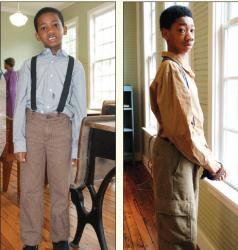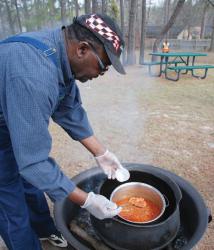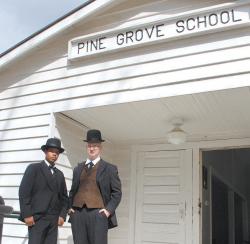by Cieslafdn | Mar 27, 2017 | School Restorations
The Siloam Rosenwald School of Charlotte, North Carolina could have a new home by October.
The Charlotte Museum of History has taken the initiative to restore and relocate the Siloam School. The school had been uninhabited and in a state of disrepair for 50 years. Located in University City, the Siloam School will require approximately $600,000 to restore it for educational purposes and as community gathering place.
Rosenwald Schools emerged throughout the South during the early 20th century to provide schools for African American children. “The Rosenwald Schools were built not only to be an educational resource, but also a community gathering spot,” Charlotte Museum of History President and CEO Kay Peninger said.
October marks the centennial of the Rosenwald Foundation’s incorporation. There used to be a “Rosenwald Day” during the school’s heyday. “It was typically held in March or April. I’d love to find out more about that and maybe have a Rosenwald Day in April just to kind of help with the fundraising… Wouldn’t that be cool to have the building here by 2017?” Peninger said.
The restoration, move, and installation of the school are all contingent upon how quickly funds can be raised. The GoFundMe Page can be found here.
Read the full article here.
by Cieslafdn | Mar 21, 2017 | Rosenwald Fund

Pictured from left: With special thanks to Barbara Johnson who attended Great Branch, Gladys Moss of Bowman Rosenwald School, Joseph C. Sanders of the Berkeley Training High School, Delona J. Kindell of Great Branch, Melissa Evans Sherman of Felton Training School, Henry Summers and Elain Summers of Bowman Rosenwald School, and Ellen Zisholts co-president of the Center for Creative Partnerships- Photo by John Mack, T&D
On March 16, 2017 Aviva Kempner’s Rosenwald was featured in the Communty Cinema social justice film series, hosted by Orangeburg-Calhoun Technical College and the Center for Creative Partnerships.
Julius Rosenwald, a true pioneer in social justice, truly believed in improving the lives of African-American children through education. Rosenwald would build 5,300 schools throughout the Southern United States. From 1912 to 1932, roughly 500 “Rosenwald schools” and auxiliary buildings were built in South Carolina. Twenty-one were constructed in Orangeburg County alone, one of which was the original Felton Training School on the campus of South Carolina State College in 1925.
In 2006, a national orginazation of 10,000 African-American women known as The Links, adopted a program called “Rosenwald Schools”. This was orchestrated by the Orangeburg chapter of The Links with the goal of placing historical markers at all 21 sites in Orangeburg County. Thanks to their efforts, four schools in the county have been able to receive these historical markers.
Along with the construction of the Rosenwald schools, Julius Rosenwald also provided funds to Booker T. Washington to assist in the building of Tuskegee Institute in Alabama.
“My M.O. is to make films about under-known Jewish heroes,” Aviva Kempner, director of the film, said. “I would say Julius Rosenwald is right there on the top of being the most under-known until the film’s come out.”
Several people that attended the showing were actual students at Rosenwald schools as children and teenagers. Gladys Moss, a 1952 graduate of the Bowman Rosenwald School, attended from first through 11th grades. “I display my diploma proudly,” Moss said. “We had a wonderful school. Taught us a lot.”
Find more on the article here
by Cieslafdn | Mar 20, 2017 | School Restorations
Congratulations to the Ridgeley Rosenwald School for their 90th Anniversary Celebration!
The celebration started Sunday, February 28, 2017 at 3:30PM with special guest speaker Ms. Elizabeth Hewlett, Chairman of Prince George’s County Planning Board, Maryland-National Capital Park and Planning Commission.

Elizabeth Hewlett, Chairman of Prince George’s County Planning Board, Maryland-National Capital Park and Planning Commission.

Christopher Deutsch (above) the great, great grandson of Julius Rosenwald.

Ms. Mildred Ridgley who attended the school was in the audience for the celebration. She is featured in the Rosenwald film DVD Bonus Features.

Ridgeley Rosenwald School was built in 1927 for African American elementary students.
Built with assistance from the Rosenwald fund, the school has been renovated and today it serves as a historic school museum. The program and the school is sponsored by the Delta Sigma Theta Sorority also known as The Deltas; and supported by The Maryland National Capital Park and Planning Commission.
by Cieslafdn | Mar 20, 2017 | School Restorations, Social Justice Work
In 1923, the Pine Grove School was one of fifteen Rosenwald schools in Richland County, South Carolina. The Pine Grove School is the only original Rosenwald School in the county that still stands today.

Brothers Graeson and Kincaid Cunnings portray former Rosenwald students Jasper and James during the dramatized “Visit with Former Rosenwald Students.” – Photos by Lisa Smarr
In 1912, the Rosenwald Fund contributed money for the building of such schools for African-Americans in the southern United States. Pine Grove closed in 1950 and for decades remained uninhabited and in disrepair. The school would finally be restored in 2004 as the Pine Grove Community Center on 937 Pineywoods Road. In 2009, the center was added to the National Register of Historic Places.

Mack Burgess hosts Catfish Stew Tasting. –Photos by Lisa Smarr
Last February in honor of Black History Month, the Pine Grove Community Center was a site for a heritage celebration. Activities included a dramatization and visit with former Rosenwald students; heritage food, games, and crafts including quilt making, butter churning, catfish stew, and hopscotch; and special guest visits from historical figures “Julius Rosenwald” and “Booker T. Washington”

Mr. Booker T. Washington (left), portrayed by Shaban Ghaffur and Mr. Julius Rosenwald, portrayed by Bryan Lee, welcome guests into the Pine Grove School.- Photos by Lisa Smarr
Read full article here.
by Cieslafdn | Mar 15, 2017 | School Restorations
Read more of Mark Price’s article here:
The Charlotte Museum of History, is heading a project intended to save and restore the historic Siloam Rosenwald School. A school built for black children in the 1920s, funded by Julius Rosenwald. The ambitious, $600,000 plan was unveiled last week by preservationists and historians.

A crumbling piece of Charlotte’s African-American history will be transformed into a community attraction. Charlotte-Mecklenburg Historic Landmarks Commission
The nearly century-old building must be moved more than 10 miles south of its original location near UNC Charlotte to the museum’s east Charlotte campus at 3500 Shamrock Drive. There, it will be restored as closely as possible to its original schoolhouse appearance. It will be filled with exhibits on local African-American history and opened to the public for daily tours. The move will happen in the middle of the night to avoid traffic.
The museum intends to raise the money though community donations, including a GoFundMe page. A campaign kick-off has been set for March 25 at a special ticketed event.
Kay Peninger, the head of the museum, realizes it may not be an easy sell to a community with countless social needs. “A community approach built the school and we want a community approach in saving it,” Peninger said. “I think that’s a very meaningful part of the history of the building. It’s a spectacular achievement to think that in the Jim Crow era, when segregation was strong and legally mandated… the community came together for this, blacks and whites, to give money.”
The Siloam School will be the first in the county to be preserved and opened to the public for daily tours. Thousands of people visit the Charlotte Museum of History each year; many of them are children on field trips. Museum officials believe the building and its exhibitions will help provide attention to the region’s often ignored African-American history.

Built in 1921, The Rockwell is Mecklenburg County’s oldest known Rosenwald School. This photo was taken in 1931. HO
In years past, the museum focused largely on European migration to the region, aided by the historic Hezekiah Alexander House on the campus grounds. The house was built around 1774.
“We want our history museum to tell as many of the community’s stories as we can,” said museum trustee Mary Newsom. “The Rosenwald story is one of determination, courage and optimism on the part of African American residents, and we hope we can keep it alive for future generations.”

From the GoFundMe page for Siloam School campaign

Exterior of the Grier Heights community’s handsome 88-year-old Billingsville School, a historic Rosenwald school fully restored. Diedra Laird dlaird@charlotteobserver.com













Recent Comments